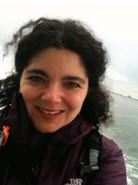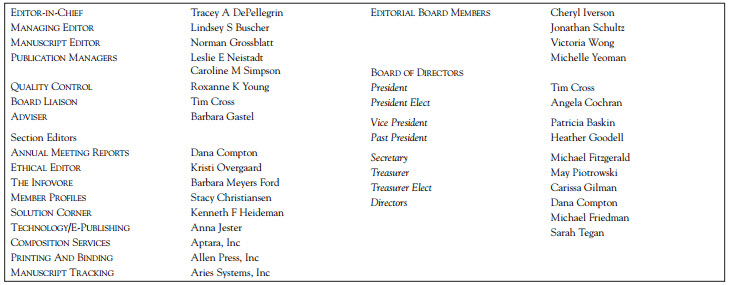
Editor-in-Chief, Science Editor
This issue marks my first as editor-in-chief of Science Editor. I appreciate the opportunity to serve CSE, my colleagues, and our community. In time to whet your appetites for the 2015 CSE annual meeting in Philadelphia, we’re publishing our final group of meeting reports from Austin. These still-relevant topics include
- solving issues via crowdsourcing
- applied uses of supplemental data
- when video works (and when it may not) in journals
- new tools to enrich journal articles
- nuts-and-bolts reports on 21st-century libraries
- insights from CSE leaders about volunteering
- helping Asian authors to comply with Western editorial expectations and standards
- working from home
- big-data science—ways editors and publishers innovate and contribute to creating standards
In addition to the meeting reports, this issue features a diversity of articles, information tidbits, and familiar authors and departments. Read Barbara Gastel’s coverage of a session from the 2015 AAAS Meeting outlining the soon-to-be-published Integrity in Scientific Research from the National Academies. She captures the essence of the session’s open discussion and perspectives and previews the report’s topics, such as detrimental research practices, a changing technological environment, the complexities of research misconduct, and setting best practices. Hypothes.is founder and CEO Dan Whaley along with Maryann Martone, director of Biosciences Division, describe the benefits of an open, interoperable standard for annotating scientific manuscripts and published articles. CSE member and an attorney specializing in intellectual property and research integrity issues in publications, Debra Parrish discusses a recent case that illustrates the tenuous balance in deciding at what point in a research misconduct investigation a journal should be notified of the alleged misconduct. In her latest Infovore column, Barbara Meyers Ford gathers a slew of information portals related to research (of a different sort than we’re used to). Science Editor Managing Editor Lindsey Buscher, project manager for Scientific Style and Format 8th Edition (SSF8), outlines some of the most important highlights in the latest edition. And finally, in Science Editor’s interview with ORCID Executive Director Laurel Haak, we learn not only about ORCID’s rapid growth (they’ve just issued their one millionth identifier!) but ways ORCID is working to implement standards—and just how that translates into benefits for publishers, libraries, researchers, and authors.
What’s Next for Science Editor?
Time is one of our most precious commodities. While this platitude has been true for eons, the influx of information competing for our time and attention is a more recent—and often overwhelming—phenomenon. Science and technology offer thousands of ways to find what we’re looking for (and many times, what we’re not looking for!). In fact, our report in this issue covering the big-data session from the 2014 Annual Meeting underscores that many of the related barriers involve not amassing the data themselves but rather properly analyzing, interpreting, and applying meaning to the morass of information.
Consider whole-genome sequencing, which in theory offers raw data on the 3.2 billion DNA base pairs—or 6 billion nucleotides that make up a person’s DNA. Although the numbers are scintillating, deriving meaning from this mountain of genetic information is even more complex than the data themselves. In the truest sense, we have more information than we know what to do with. Even Google, with its relevancy ranking based on more than 200 indicators, isn’t always (or often) on the mark with its search results. Try entering “ethics in science” into the field for a Google search, and witness more than 149 million results. Where to start?
Though the science and practice of interpreting such data and results could fill several of these columns, this is where our story starts to coalesce. How do lofty concepts such as time, information, resources, and expertise relate to Science Editor and to you?
Whether you’re part of a large organization investing heavily in research that contributes to our field or you’re a consultant and change agent, Science Editor—and CSE—provides a forum for not just learning the standards but helping to set them. We offer an economy of scale that allows many of us to collaborate, to discover, and then even to educate our own organizations and apply our newfound knowledge.
At Science Editor, we seek out and provide knowledge you can reuse in the context of your organization. Our editorial board members, with their insight and expertise, ensure that you’re kept up to date on what matters in the field. Instead of spending your time finding and interpreting the latest public access legislation in the UK, trying to invent a process for reviewing supplemental information that another publisher has already successfully created, determining what steps to take when your editors suspect author plagiarism, or wanting to explain the scholarly publishing landscape to a new board of directors—we hope you will not only trust Science Editor but also be a part of our upcoming period of growth and change.
We hope you are or will become someone others seek out for the latest answers, best practices, and thoughtful discussion. We hope to help you contribute to your authors, your customers, your scholarly society, your publishing organization, or your university. To that end, we will continue the scholarship and reputation for excellence that the journal is known for, espouse a forward-thinking approach, a firm grasp on what matters to you—to our diverse constituents, and serve as an authoritative voice for resources, advice, and the latest developments affecting scientific publishing, which in turn, we hope, serves you in your career.
We’ll discuss and provide information on topics as diverse as journal data policies; ethical, legal, and social issues; the state of research funding; public–private partnerships; technology integration; and making sense of the ever-changing public-access mandates. And because Science Editor and CSE have no particular agenda, we’re able to present, discuss, and decide unfettered by noise.
In fact, I’m continually impressed with members of CSE, the ways in which we interact with one another, ask for and offer guidance, reveal organizational processes, and share opinions—all in the context of truly improving publishing and, ultimately, expanding our roles in advancing the scientific enterprise and its larger contribution.
As of 2015, the CSE Board of Directors has provided additional support of our publication by funding a new position of Managing Editor. To that role, we welcome Lindsey Buscher. An active member of CSE, Lindsey, as many of you know, most recently led the SSF8 project (she discusses its latest updates in this issue). Lindsey’s eagle eye, attention to detail, exceptional organizational skills, and ideas make her not only a well-qualified style maven for Science Editor but also a valuable colleague.
Lindsey and I look forward to building on the momentum established by my predecessor, Patty Baskin, as she takes on the critical leadership role as Vice President of CSE. Patty’s vision, tireless dedication, and mentorship exemplify leadership and camaraderie. We pledge to maintain the standards that she, along with her predecessors, including former EIC and current Editorial Board member Barbara Gastel, have set.
A testament to the dedication of Patty’s contributing editors and editorial board is that nearly all have remained, openly sharing their ideas, helping to quickly publish this issue, and volunteering their time. In addition to Patty’s guidance, CSE President Tim Cross and account manager Andrew Van Wasshnova have been patient and instructive throughout Lindsey’s and my fairly rapid learning curve.
As part of Science Editor’s mission and vision, I plan to expand the editorial board to continue to reach the diverse communities we serve and to keep up with the pace of change. I’d like to add editors in the areas of library science, publication ethics, international publishing, and others. I also want to add editors who are practicing scientists, clinicians, researchers, software developers, and industry representatives. We welcome inquiries or nominations for positions on the editorial board. While we’re fortunate to be part of CSE under their umbrella of committees, Science Editor also seeks volunteers to serve in other roles, such as copy editors, graphic designers, and interns. Email me at td2p@andrew.cmu. edu if you have questions, ideas for articles, or would like to talk further about volunteering.
Finally, on a personal note, my work with CSE is inspired by the scientists, editors, innovators, and colleagues in myriad fields with whom we are privileged to work. My view is that we are all cogs in the wheel—some cogs bigger than others—but cogs nonetheless. For the wheel to turn smoothly, the cogs must work well together. I’m proud of the ways we serve our fields, each other, and ultimately science. I’ve seen a range of publishers, editors, consultants, scientists, developers, copy editors, production assistants, and editorsin-chief epitomize innovation, commitment, and unity in service of a mission and a community. I hope to provide a venue for discussions on best practices for those occupying these and other roles in scientific publishing.
My role as editor-in-chief is also dedicated to fostering our next generation of explorers: to my daughter Sophie and her love of words, nuance, history, and adventure; and to Anna and Vance, with whom years of conversations about science and the latest technology, plus grammar debates and their interest in art, brought delight and inspiration, along with a stream of neverending curiosity about robotics, astrophysics, plants, weather, and birds. Even now, as teenagers, each holds firm a belief that discovery and ideas—most notably, science—will make the world a better place.
Let’s make sure these scientific discoveries and ideas are communicated clearly, effectively, ethically, broadly, deeply, and in ways that resonate with our respective audiences. I’m committed to encouraging that end.
If you’re in Philadelphia, please find me and let’s chat over coffee.
Tracey DePellegrin is editor-in-chief of Science Editor. She is also executive editor for the Genetics Society of America Journals GENETICS and G3: Genes|Genomes|Genetics. She serves on the publications committee of BioScience, published by AIBS, the Communications Committee of the Society for Scholarly Publishing, as well as the CSE Program and Editorial Policy Committees. She has been an adjunct faculty member of the Department of English at Carnegie Mellon University (CMU), has held positions as a human factors researcher and information analyst for CMU Library Information Technology and as a managing editor, journalist, science writer, and copyeditor. DePellegrin created a Literacy Through Photography course, which she taught to children living in high-risk environments. She holds an MA in English from CMU, and a BS in marketing with an emphasis in economics from Penn State University. She enjoys kayaking, sailing, hiking, corvids, editing (really!), and anywhere within sight of the Pacific Ocean. Her 14-year-old daughter Sophie spends her free time acting, reading books about Tudor England, and writing fiction. Sophie laments that both her parents are editors who help with homework assignments via internal reviews and acceptwith-revision decisions.

